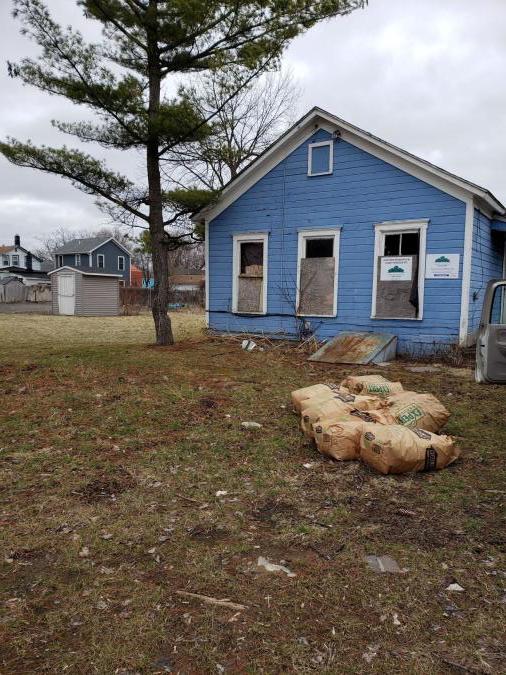Marcellus Street Gardening and Bicycling Center
A community resource tool library and materials depot for gardening, bicycling, and home landscaping. Building capacity for food sovereignty, mobility needs, and pride in home and self.
Leader
Frank Cetera
Location
713 Marcellus Street, Syracuse, NY Syracuse, NY 13204
About the project
During the spring and summer of 2019, a competing bid was put to the Syracuse Land Bank to purchase a mixed use residential lot at 713 Marcellus St that was trying to be acquired by a commercial interest to "pave paradise and put up a parking lot". The bid was won by the grassroots efforts which included letters of support from neighborhood residents, and organizations such as Syracuse Grows, and Rahma Free Health Clinic.
The full site will be used for growing space and as a materials depot for topsoil, compost, and raised bed materials; while the former 700 sq. ft. residential structure on the rear of the site will be converted into a multi-purpose storage and access location to facilitate sharing of tools and resources for gardening, bicycle repair, and home landscape repair and maintenance.
The site is structurally sound, and will primarily require clean-out, window and door repair, porch removal, basic handyman repairs, and lighting through a 12-volt solar system.
The Steps
The Steps:
We're ready to roll, in fact ,some of the steps that don't require funding, such as some of the identified work items that only require volunteers, are already underway. Once we succesfully fund, we'll hold a special event at the site in June to celebrate, grill up some veggie dogs and burgers, and invite the community to come learn about the project further, and hopefully sign up to volunteer. Work efforts will be scheduled for bi-weekly calendar weekends from June through November. The Project Manager will coordinate ordering materials, and the Volunteer Coordinator will communicate with people and organizations.
Clean-out, door and window repair, along with yard and landscape, are scheduled to be completed by the end of August. Electric and skylight installation by end of September in anticipation of shortening daylight. Special project of Rasied Beds Mutual Aid will be undertaken immediately upon reception of funds, and will be ongoing until all materials are distributed.
We expect that the sharing platform will be operational starting in September following the clean-out and baseic repairs.
Why we‘re doing it
"Food sovereignty", a term coined by members of Via Campesina in 1996, asserts that the people who produce, distribute, and consume food should control the mechanisms and policies of food production and distribution. This is a basic need negatively impacted by the COVID-19 pandemic in the short- and medium-term. Disruptions to food sovereignty include: Increased unemployment, Increased demand for grocery store stock, and strained supply logistics to restock stores.
To help achieve resilient food systems, Alchemical Nursery is providing garden resources and services through its COVID-19 Response Project campaign which includes a holistic array of resources and services including:
- Virtual Gardening Tutorials
- One-on-One Gardening Advice over email/phone/video conferencing.
- Syracuse & CNY Seed Share platform,
- Tool sharing and education,
- and Raised Beds Resources Assistance (proposed in this application).
In this proposal we seek funding to provide safe soil, building materials, transportation of materials,education for raised bed food gardens, structural/utility/security renovations to the tool shed; prioritizing those in greatest need due to financial and health vulnerability according to UN (ref1) and CDC (ref2) guidelines.
We are fortunate to live in a productive and progressive farm region, but this does not resolve issues of access within our region and of need in less food secure sub-regions such as very low income urban neighborhoods. Food, fiber, medicine, fuel may all be much more challenging to procure with a health and economic crisis and strains on supply chains in the short- and medium-term. Upstate farms can provide those key ingredients for happy and healthy humanity, and increasing home food gardens can reduce the burden on our region’s farms and enable them to help broader areas. Home and community gardening also has significant co-benefits including:
- Physical health through outdoor exercise;
- Better nutrition through nutrient dense foods;
- Ready access to herbal remedies (e.g. Elderberry for flu treatment, see ref3 below);
- Mental health through a sense of purpose and fulfillment doing vital work at a time when many occupations and habits are disrupted and strained;
- Assistance meeting household budget by reducing costs associated with food and potentially transit to stores;
- and safety by minimizing the need for store visits and reducing the burden on food distribution points.
The immediate need of soil, and access to tools and other supplies, to start raised beds, food landscaping, and other food garden features will have near- and long-term benefits addressing a variety of basic needs. Food crops such as radishes, lettuce, and certain herbs can be ready for harvest in as little as 30 days. In addition to supporting beneficiaries’ immediate needs, this raised beds program will improve home food security for years and possibly decades to come.
References
Ref2: https://www.cdc.gov/coronavirus/2019-ncov/need-extra-precautions/people-at-higher-risk.html
Ref3: Zakay-Rones et al. 2004, https://www.ncbi.nlm.nih.gov/pubmed/15080016
Basic needs being addressed:
- Food: nutrient dense, local food with minimal inputs and reliance on supply chains
- Mental Healthcare: outdoor exercise benefits, sense of purpose, cultural ecosystem services
- Healthcare (including medication): elderberry, echinaceae, nutrient dense food
- Safety: minimizing need for store visits, reducing burden on food distribution points
- Transportation: reducing costs associated with transit to stores
- Other: increasing regional resilience to food system disturbances

